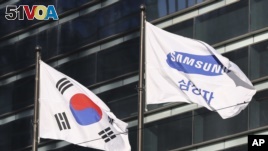07 February, 2017
American business leaders are urging South Korean leaders to increase market access to U.S. companies seeking to sell goods in South Korea.
The business leaders want to persuade U.S. President Donald Trump not to introduce policies that harm trade between the countries.
During the U.S. presidential campaign, Trump threatened to make changes to the bilateral free trade deal. The deal is known as the Korean U.S. Free Trade Agreement or KORUS FTA. Last year, Trump criticized the deal as "job killing."
The American Chamber of Commerce in Korea, or AMCHAM Korea, wants to keep the current KORUS FTA. The agreement took effect in 2012.
The deal removed 95 percent of tariffs on consumer and industrial products over five years.
James Kim is Chairman of AMCHAM Korea. He said South Korea should consider ending some regulations on imports that hurt trade.
"We need to make the Korean economy more transparent and predictable, by making the regulatory process more deliberative," Kim said recently in Seoul.
The American car industry, for example, has said it spends a lot of time and money on unneeded environmental rules. It also says it faces regulations that often are introduced without notice or explanation.
Fifteen percent of cars in South Korea are from foreign manufacturers. In other developed economies, such as the U.S. and European countries, foreign cars make up 40 percent of the market.
The American Automotive Policy Council says nearly 80 percent of the trade deficit with Korea is in automobile trade. That deficit was almost $28 billion in 2015.
Jeffrey Jones is a former AMCHAM Korea chairman. He says Trump's statements on trade add urgency to efforts to take care of misunderstandings about trade practices. But, he says time is running out.
Supporters say KORUS agreement is working
AMCHAM Korea is sending a group to Washington, D.C., to defend the current trade agreement. The group wants to speak with lawmakers about how the trade deal is working.
South Korean officials say most problems have been solved through negotiations. They say the trade agreement also has helped the U.S. economy.

Samsung says it is to make a $17 billion investment in the U.S.
The Korea Automobile Manufacturers Association says U.S. car imports to South Korea have increased by 20 percent in two years.
AMCHAM Chairman Kim says one way to build support for the U.S.-Korea trade agreement is to show how American exports to South Korea have increased. U.S. exports to South Korea of all products and services have risen by 8 percent in the last 10 years.
Exports of some agricultural products have increased sharply since the free trade agreement has gone into effect.
Kim notes that several Korean companies, including carmakers Hyundai and Kia, have opened factories or offices in the U.S. The Korean companies have created more than 45,000 American jobs.
Recent news reports suggest that Samsung Electronics is considering opening a new manufacturing center in the U.S.
Trump wrote on Twitter, "Thank you, Samsung! We would love to have you!"
Samsung did not confirm that it would build a new factory. It did say, however, that it was making an investment of $17 billion in a semiconductor factory in Austin, Texas.
The trade agreement between the U.S. and South Korea is bilateral, meaning between two sides. It is unlike the huge 12-nation Trans-Pacific Partnership deal from which the U.S. withdrew, or the North American Free Trade Agreement, or NAFTA, which Trump has also criticized.
Korean companies with operations in Mexico, however, are concerned they could face increased tariffs if NAFTA is renegotiated. NAFTA covers trade among Mexico, Canada and the U.S.
I'm Mario Ritter.
Brian Padden reported this story for VOA News. Mario Ritter adapted it for VOA Learning English. Ashley Thompson was the editor.
______________________________________________________________
Words in This Story
Consumer –adj. relating to goods and services bought by people
Regulations –n. rules or law about how something should be done
Predictable –adj. not unusual, happening in a way that can be foreseen
Deliberative –adj. doing something in a way that includes discussion of facts and thoughtful decision-making